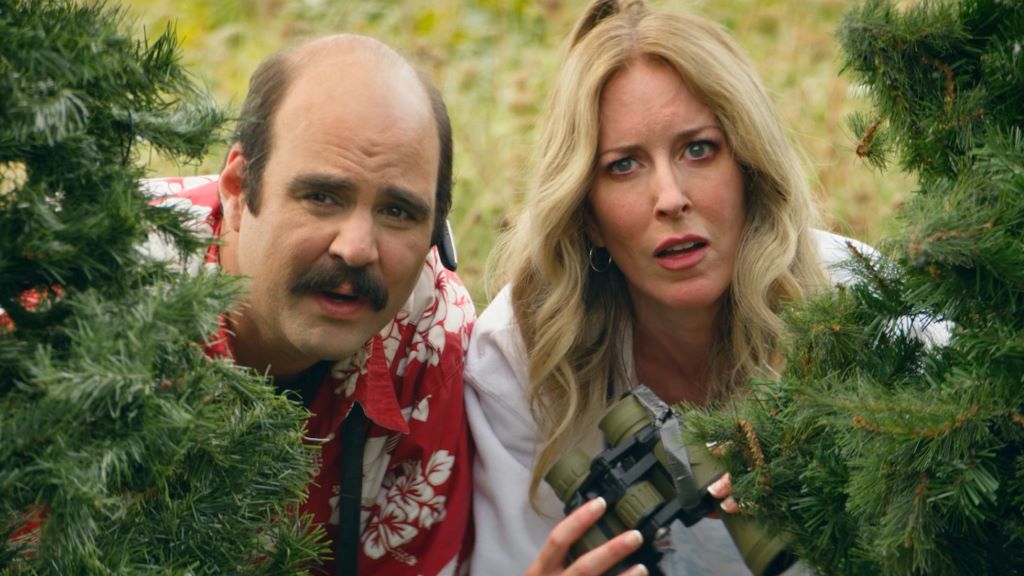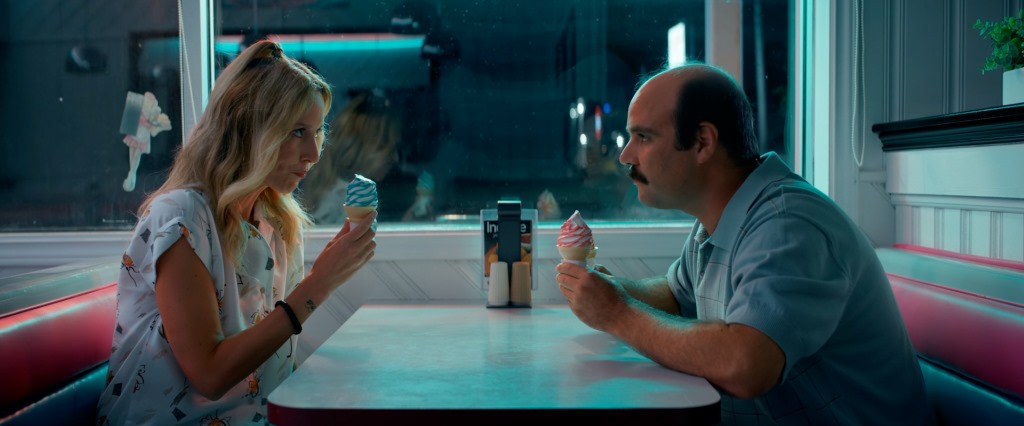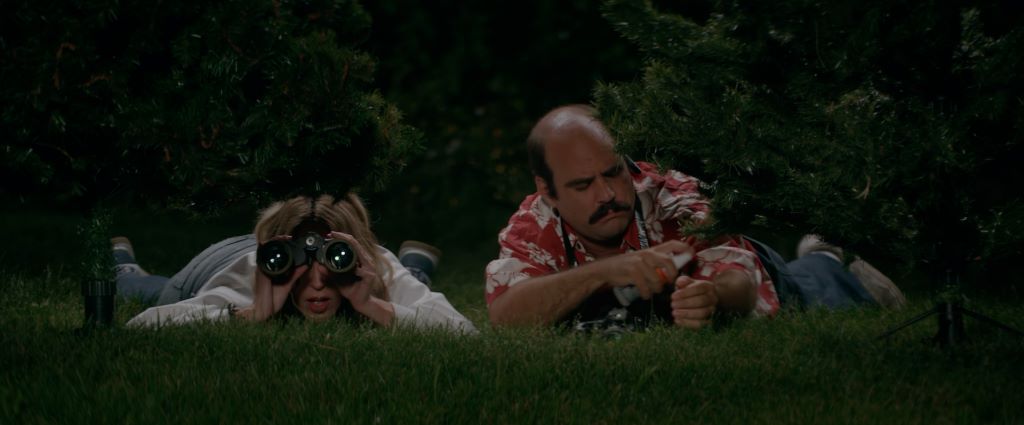Reviews include M3GAN 2.0, Familiar Touch, and I’m Your Venus.
‘Who’s Yer Father’ cast on PEI-set comedy and the state of Canadian film
November 10, 2023

It’s not every day that you get a film from Prince Edward Island. Capturing the heart of islanders and their culture comes the comedy, Who’s Yer Father.
Written and directed by Jeremy Larter and starring Chris Locke and Susan Kent, the film follows a novice private investigator who is hired by a wealthy seafood buyer to investigate black-market lobster sales. He uncovers much more than he was expecting in the heart of Prince Edward Island.
Last week, the film had its grand premiere in Charlottetown. After a successful tour on the East Coast, Who’s Yer Father opens in Toronto Friday, including a Q&A on November 11 with Jeremy, Susan and Chris.
Ahead of the premiere, I sat down with Lanter, Locke and Kent to talk about making their comedy, the East Coast charm and the current state of the Canadian industry.
Congratulations on the film. We’re finally here. How does it feel?
Jeremy Larter: It feels pretty overwhelming to me. It’s been a dream of mine since I was a teenager to be a filmmaker, and then to have my movie playing in my home province is really incredible. Everyone’s been so supportive, and kind about it. I wasn’t expecting to feel so emotional about today, but I definitely am.
Susan Kent: It doesn’t seem real in a way. It’s been a little more than a year since we finished. You have this intense, incredible experience with everybody making a [film] together, and then you go away, and the rest of your life sort of comes back. It sort of starts to recede into memory and then to be back here all together again… it’s so exciting.
Chris Locke: It was this special comedian’s dream to be a part of this movie and get this much time to play with such freedom and such an incredible crew and cast. We literally laughed and had a great time for a month straight last year… I was at the premiere and Halifax [Film Festival] in September. They really stuck the landing, and it’s excellent. All those vibes are up there on the screen and I saw the audience really responding to that. They loved the movie uproariously. It was very overwhelming, like a feeling I’ve never felt before. So I’m really excited for Jer’s hometown to get blasted away by how fun this is.
What is the significance of the title, Who’s yer Father?
JL: Well, ‘Who’s your father?’ It’s a question that gets asked a lot around Atlantic Canada, especially if you’re new coming in. It’s a way of trying to figure out, ‘Do we have a connection to each other?’ It’s because the degrees of separation in PEI [are] so small…It’s a question that brings connection. Then in the film, it plays a role because of the private investigator. The comedy of that, to me, was based on that idea of connection and how closely connected people are on the island and how hard it would be to be a private investigator in a place so small.
What were you looking for when this role came to you?
SK: The way Jeremy wrote it, it’s like you get to do everything. Because you get to do jokey stuff, but then I felt like I got to do a lot of true things and grounded things and emotional things. It was a gift of a script because you get to paint with all the colors.
CL: It is true, you get to use every tool–every comedic instinct I’ve learned over the last 20 years like is up there. Exercises like what Sue’s saying about the sweet aspect of the romance. We really worked hard on that. I think it’s all up there perfectly on the screen. [I’m] really proud of that. Ever since I was a little kid watching like John Candy and Bill Murray and Chevy Chase-driven comedies, it was like, imagine I got to do that one day.
JL: Some of my favorite scenes in the movie are the quieter scenes between Chris and Sue–those quieter, romantic, little moments of connection. Like when they’re sitting in the van together and when they’re outside the store, looking at the stars, and they have their first kiss…those are my favorite scenes.
Jeremy, you’ve said this was an ambitious film, especially with the exterior shooting and the night shooting. Can you talk a little bit about that?
JL: Yeah, it was a big film to shoot in 18 days. Half the movie was shot outside and then a quarter of it was shot at night. I’d never done anything that involves stunts before, which is a challenge. We had a seven-person main cast, so that’s a challenge because you have to bring actors in and out, and scheduling all those different actors is a challenge in PEI. We’re a booming film community here. It’s a mix of PEI technicians and Halifax technicians mostly, and we have really great people here. It’s a big film to shoot on such a tight budget. A challenge for shooting in PEI in summer is that all those places are in demand, like motels, convenience stores, golf courses, [and] ice cream parlors are all in full swing in the middle of summer. The community here is so supportive, and has been supporting the things that we’ve been doing for so long–they really came through for us to help make it.

What is the beauty about PEI that you wanted to capture and translate on screen?
JL: For me, half the locations in the film are within a 10-minute drive. Where I grew up, Richard’s Wharf was a place that actually worked out. I worked as a lobster fisherman for one summer. I grew up in that world and it always meant something to me.. The way people speak and the way they communicate, and the way that they bond was important to me. There are little idiosyncrasies of island culture that stuck in my brain and I want people to know about them. It’s sweet and funny. It’s not just about showing how beautiful it is. But I think it’s just showing the world that that exists here.
Chris, Susan, what did you love about filming here?
CL: It didn’t make it hard that the locations were absolutely beautiful and stunning. The melting creamsicle skies at 5:00pm, and I love the ocean so much.
SK: It’s such an idyllic place in the summer. It felt like you’re getting to be on vacation while you work. But the other thing that made it great was the crew here and the feeling and the tenor of the people: everything was always so fun. Everybody works really hard and has a hilarious laid back attitude.
JL: Also, the laid back ways of Islanders, and their willingness to help. I noticed that islanders will do anything to help you. Like if you put your car in a ditch, they will spend the rest of their day trying to help you get everything they have to do on hold.
CL: That’s what Toronto’s like. [Laughs.] In Toronto, if your car goes in the ditch, someone kills you.
Chris, being from Toronto, what have you seen as the biggest difference in terms of the filming community here?
CL: It really felt like a tight knit crew of very talented artists in their own right in every respect that they were working in, even if we had some green people that are newer to the industry, but they were putting everyone’s heart and love into it. In Toronto, there’s so many lovely people to work with and a lot of productions, but there’s also a factory feel to it, like, ‘We’re making a product here.’

Our industry with Canadian films is constantly evolving, so I like to ask filmmakers and actors, what do you love about our industry and what would you like to see change?
JL: This year in Canada was an incredibly good year for feature films. I don’t know if people really know that, but like if you look at all the films that have been playing at the festivals, it’s been an incredible run for Canadian film this year. I think Telefilm, a funder of this film, has done a lot to change their funding model to allow newer filmmakers to come into the fold, which is really great. I think you’re starting to see that pay off. Now we [have] more filmmakers getting a chance to make a film, different stories are being told than before. I would like to see more people going to see Canadian films. I think it’s really important and a big part of that is marketing, having the money to actually market a film properly and get it coast to coast because we have important stories to tell. It’s important to see ourselves on screens, and to have that connection watching something together rather than just watching in our own living rooms.
SK: What I love about it is the grassroots-ness and how it feels like, with most projects, everybody’s really like pulling together to make something happen. What I would love to see change is more funding, more funding avenues, more ways to make films, and not have to make tons of compromises in order to get your film made. Because it just costs what it costs.
CL: If you stay in Canada, to stick it out here, then it’s really lovely because you’re doing it for the love. You’re actually getting really good at your craft, because you do it to work on it for yourself and your peers, you challenge each other, which is nice. You’re not going to LA to just try and be famous. The art comes first, which I find is the case in my circle of friends and artists’ groups – that’s the main drive. A lot of brilliant creative people out there could really make stuff in this country just explode, and of course, it would be sold internationally because it would be incredible, but we get stifled with some conservative-minded thinking.
JL: I remember 15 years ago, people would tell me in the industry, ‘You cannot make your story. You cannot set your story in PEI. It will not sell. You have to make it take place in America, not even Canada. Like, you have to pretend that this is the United States.’ That was the attitude for a long time. You can’t make a PEI story, let alone a Canadian story. I’m glad that’s changed. I remember in the ‘60s and ‘70s, with CBC and everything else, there was a real Canadiana that was coming out. We’re proud of our roots, and there was a connection to that and culturally we do really wonderful things. I think we just have to keep embracing that and not be afraid to embrace it.



